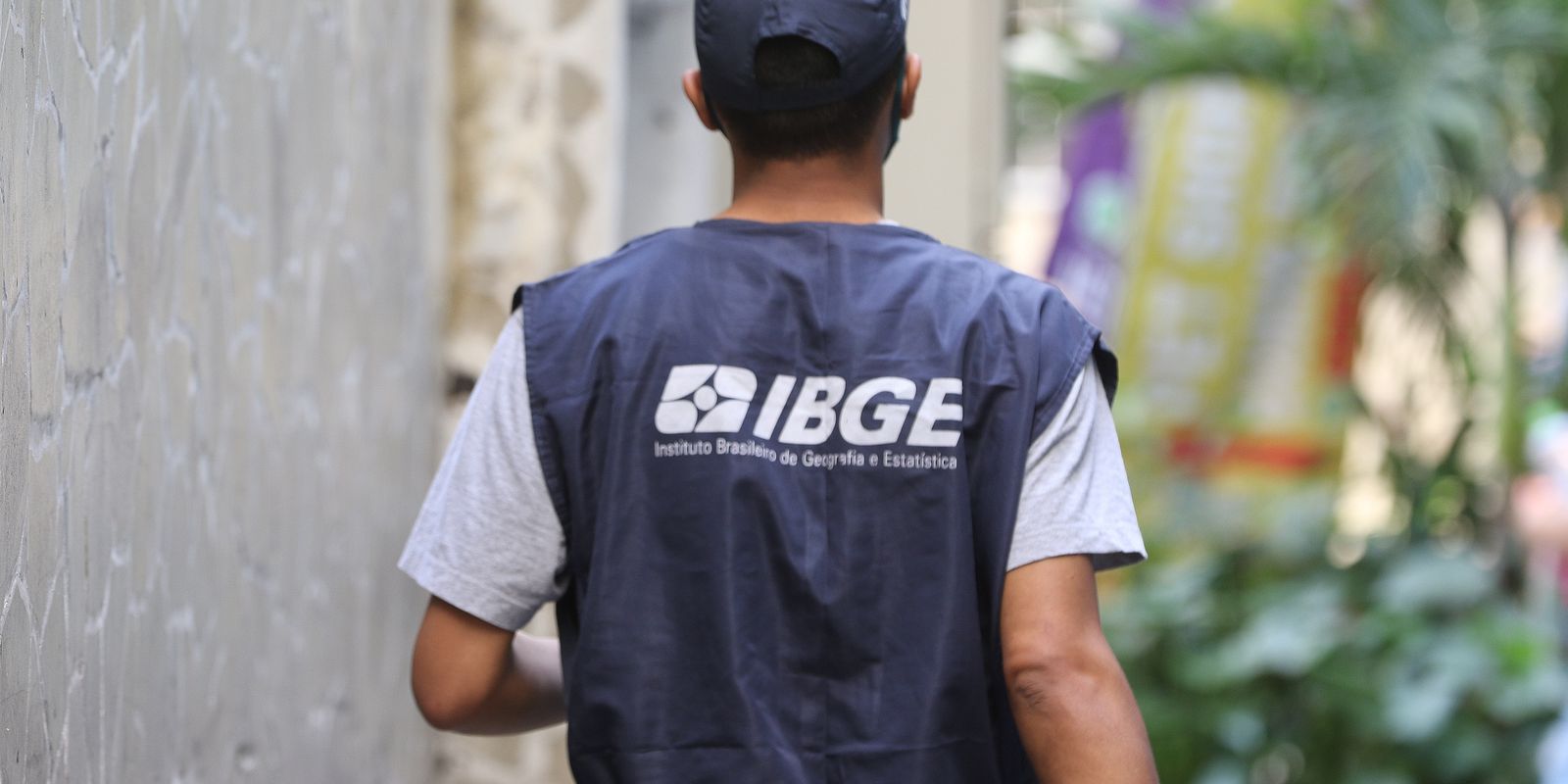The Brazilian Institute of Geography and Statistics (IBGE) assured that the 2022 Demographic Census is being carried out in a transparent manner, with several control mechanisms. He added that the survey strictly follows the necessary steps, which ensures quality in all phases of the operation. Until the 24th of this month, around 89 million households were visited. So far, 184 million people registered.
The IBGE pointed out that the quality of the coverage of a census, during the operation, is monitored through indicators of the supervision system and modern and unprecedented geotechnology tools, in addition to returning to the field for verification in loco (at the place).
In addition, the 2022 Census has the Post-Enumeration Survey (PPE), carried out by sampling census tracts. The main intention is to offer resources for the evaluation of the coverage and quality of the collection.
“The PPE starts when the selected sectors are completely collected and supervised by the Census. The disclosure of the PPE is foreseen in the disclosure plan of the 2022 Census”, he clarified.
The IBGE also informed that it is dedicated to minimizing the effects of the delay in concluding the census operation on the quality of the results. “We point out that around 65% of the 2022 Census information was collected up to the month of October. We also emphasize that this is a survey with electronic collection, which reduces the possibility of error during the capture of information, since the reference dates of the survey are part of the questions inserted in the Mobile Collection Device (DMC)”, he amended.
He added that “there are coverage questions to verify the information, in addition to the planned supervision stage”.
The agency also revealed that the two delays that prevented the Census from taking place in 2020 and 2021 resulted in the improvement of some operating processes.
Carrying out national tests – which had not yet been carried out – was considered by the IBGE field teams as a good practice. In them, at least one location in each state of Brazil was visited, with around 40 thousand households analyzed and 111 thousand people registered. “It was a great opportunity to successfully test all stages of the operation, in addition to training the teams involved and implementing improvements in the collection and control processes,” said the institute.
lack of staff
According to the IBGE, the lack of personnel, especially for data collection, caused the extension of the survey period. One of the reasons noted by the institution for the shortage, in some municipalities, is related to other job opportunities existing in the place.
To reduce the problem, the IBGE adopted actions such as issuing provisional measures with the aim of making recruitment more flexible and allowing the hiring of retired civil servants. In addition, it increased the remuneration of census takers, implemented the payment of transportation assistance for teams and entered into agreements with municipal health departments and universities.
The IBGE acknowledged that, despite the paid publicity and press disclosure of all the stages prepared for the 2022 Census, including the Selection Processes, tests in Paquetá and Nacional, the Survey of the Surroundings, the Launching of the Census at the Museum of Tomorrow, the Beginning of Household Collection and Monitoring of Collection in quilombola and indigenous territories, the necessary scope was not reached, despite the visit of international observers from 18 countries, the monthly collection balances and the dissemination of previous results.
Data from the clipping contracted by the institute indicate that, since the beginning of the collection, the Census has managed to publish at least nine thousand articles, nationally and regionally. He noted that all the criticisms published by the press “were addressed and discussed in collective and individual interviews promoted by the IBGE itself, always committed to ensuring maximum institutional transparency”.
Challenges
On the way to the Census, the IBGE had to face many difficulties in the survey. Some of them were the structural changes in society, which directly impact the operation, such as the greater number of households with only one resident, changes in the job market and issues related to safety.
“These factors have made it increasingly difficult for census takers to have access to residents. We emphasize that it is not just the Census that suffers from lack of access to part of the population, this phenomenon has also been observed in household surveys by sampling”, he indicated.
In order to carry out the Census, the IBGE had, in 2022, a budget allocation of R$ 2.29 billion. Of this amount, R$ 1.76 billion was settled and approximately R$ 484 million were entered in unprocessed balances payable. “For the year 2023, the budget allocation is BRL 233,873,573”, he clarified.
The acquisition of mobile devices for collection and tablets used by enumerators, unlike previous censuses, was carried out in partnership with the Ministry of Health, which will receive the equipment at the end of the survey. “The IBGE did not cover the costs of acquiring this equipment”, he informed.
The agency also highlighted the collaboration, in an unprecedented way, of health agents, considered fully able to work in the Census, both for having been trained and qualified, and for the knowledge of the territory they usually cover in their daily tasks. Another relevant factor in the agents’ performance is their experience in approaching residents, which, according to the IBGE, represents an essential collection skill.
“We emphasize that – during the training process – the ability of these agents to deal with the National Register of Addresses for Statistical Purposes (CNEFE) became clear. Many of these agents are operating in subnormal clusters, places that are difficult to access, but which they already know. It should be clarified that these agents were recruited as census takers, following all the required hiring and training procedures”.
Justice
The IBGE note was released yesterday (24), one day after the decision by the Minister of the Federal Supreme Court (STF), Ricardo Lewandowski, who suspended the application of population data from the 2022 Census, which has not yet been concluded, to define the values for the distribution of the Municipality Participation Fund (FPM).
The minister defined that this year’s FPM should have as a minimum level the distribution coefficients used in the 2018 fiscal year. After the granting of an injunction, the National Confederation of Municipalities (CNM) recalled that the minister also determined that the values already transferred offset in subsequent transfers.
On December 28, 2022, following the determination of the legislation, the IBGE forwarded to the Federal Court of Auditors (TCU) the preliminary population data in Brazil calculated up to that moment in the 2022 Census.
The injunction, which will still be submitted to the plenary, was granted in response to the Argumentation of Breach of Fundamental Precept (ADPF) 1043, of the Communist Party of Brazil (PCdoB), that TCU Normative Decision 201/2022 causes damage to the amount received by the municipalities, as the stipulated criterion does not cover the entire population. A survey by the National Confederation of Municipalities (CNM) indicates that the new methodology would cause losses of R$ 3 billion for 702 municipalities.
Delivery
The IBGE also informed that the definitive results of the Census referring to the population of the municipalities will be known in April 2023.
Before that, the end of complete coverage of the census tracts is scheduled for January this year. Those responsible for households that have not yet been registered should call the Census Dial (137). “A service made available by the IBGE so that the population can exercise their citizenship and schedule a visit by a census taker to their home”, added the IBGE in a note released a little while ago, in Rio de Janeiro.
In February and March, “the process of reviewing, quality control and calculation of the Census will continue, with attempts to reverse refusals, revisits to homes with an absent resident to carry out interviews, in addition to checking vacant homes, for use occasional, possible duplications and omissions and preparation for disclosure”, he concluded.









